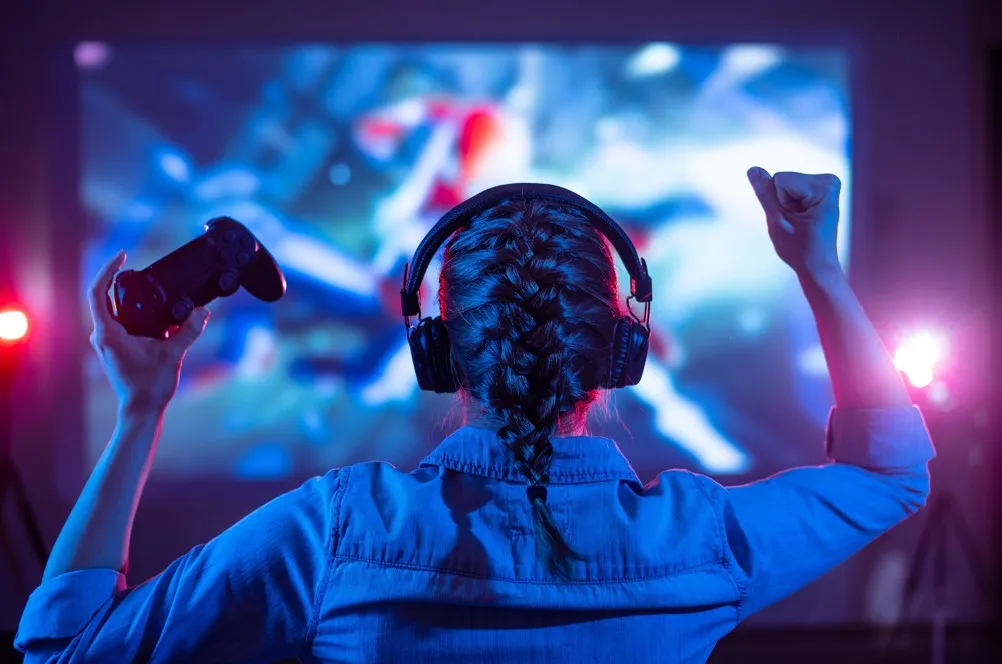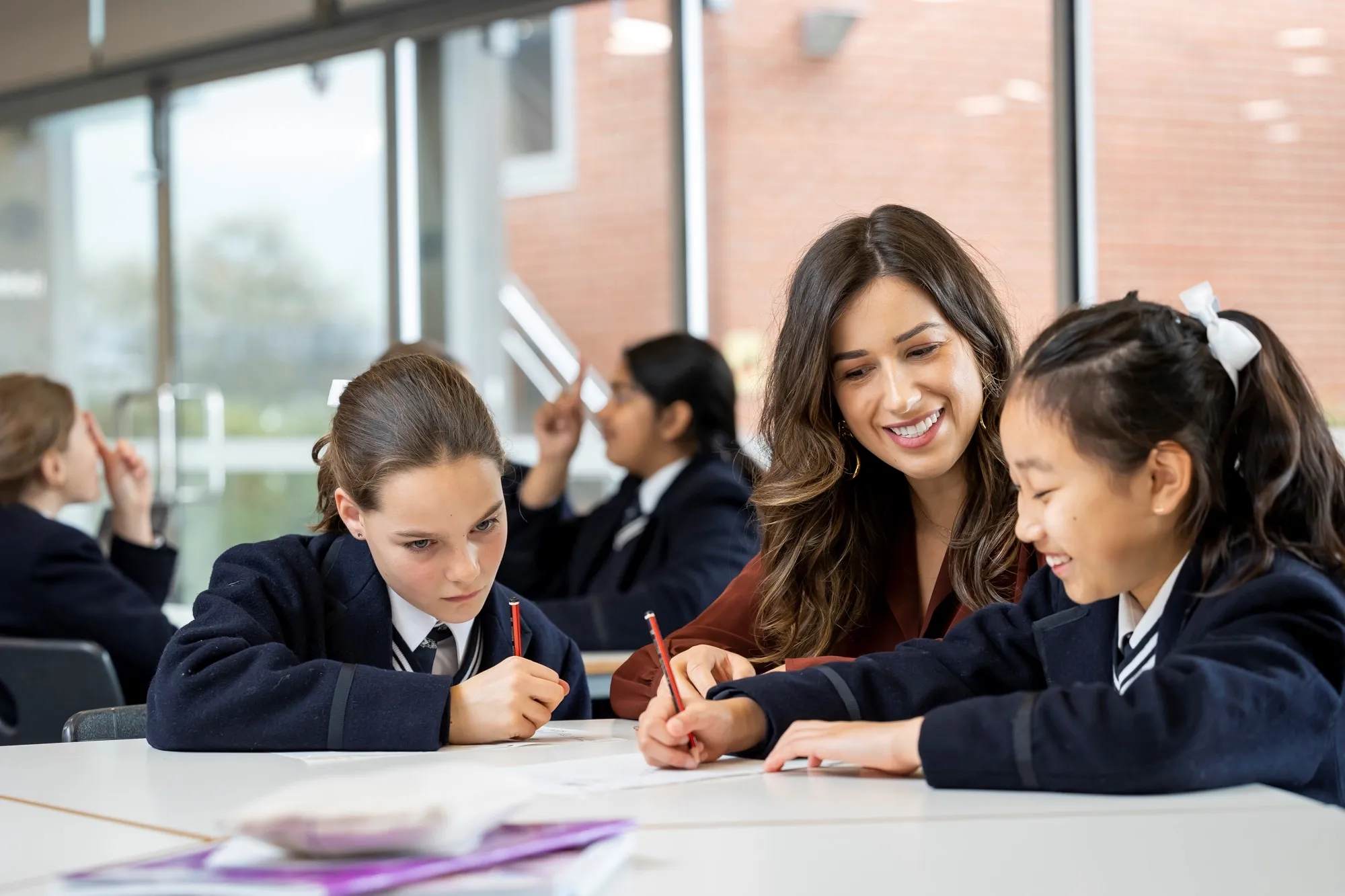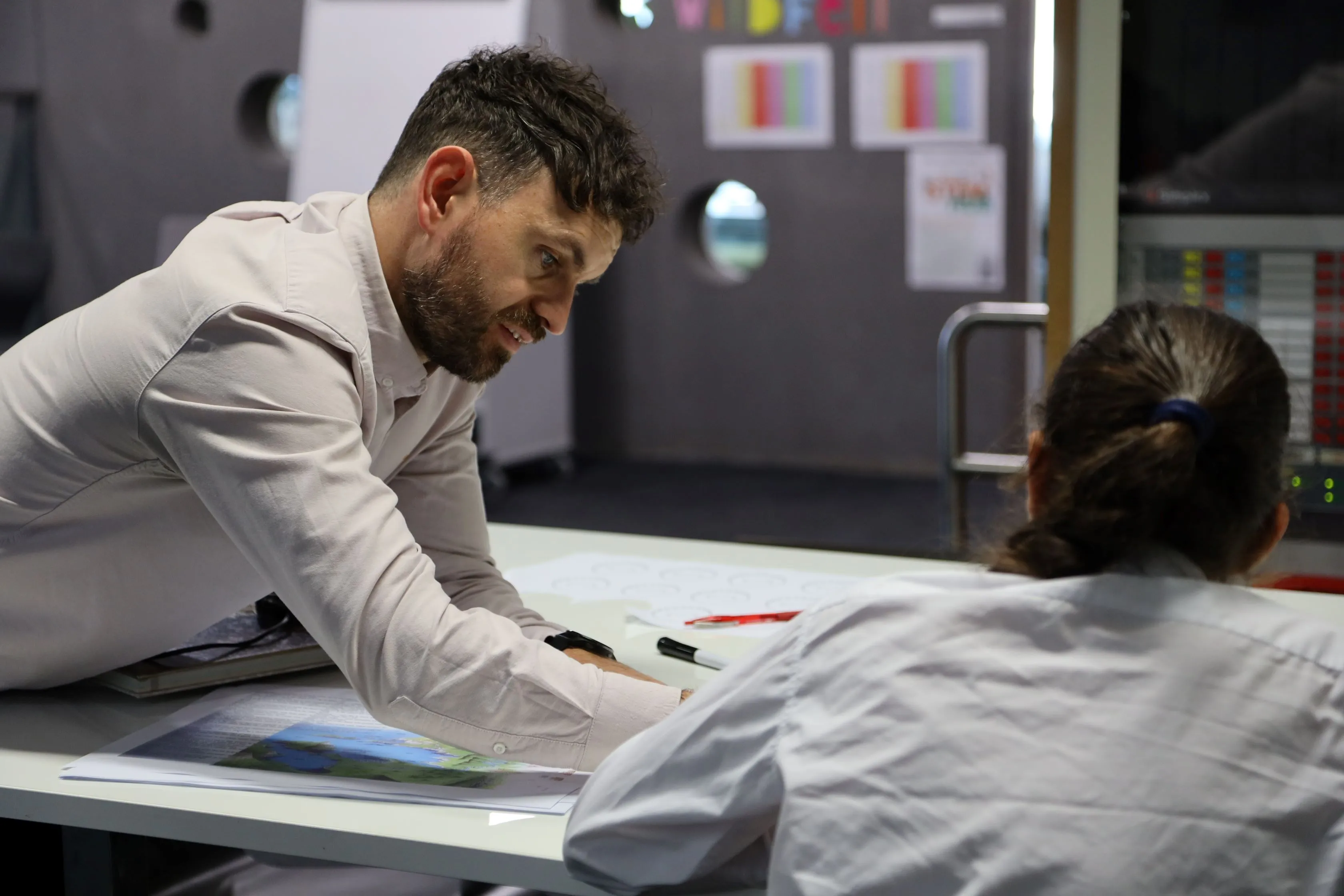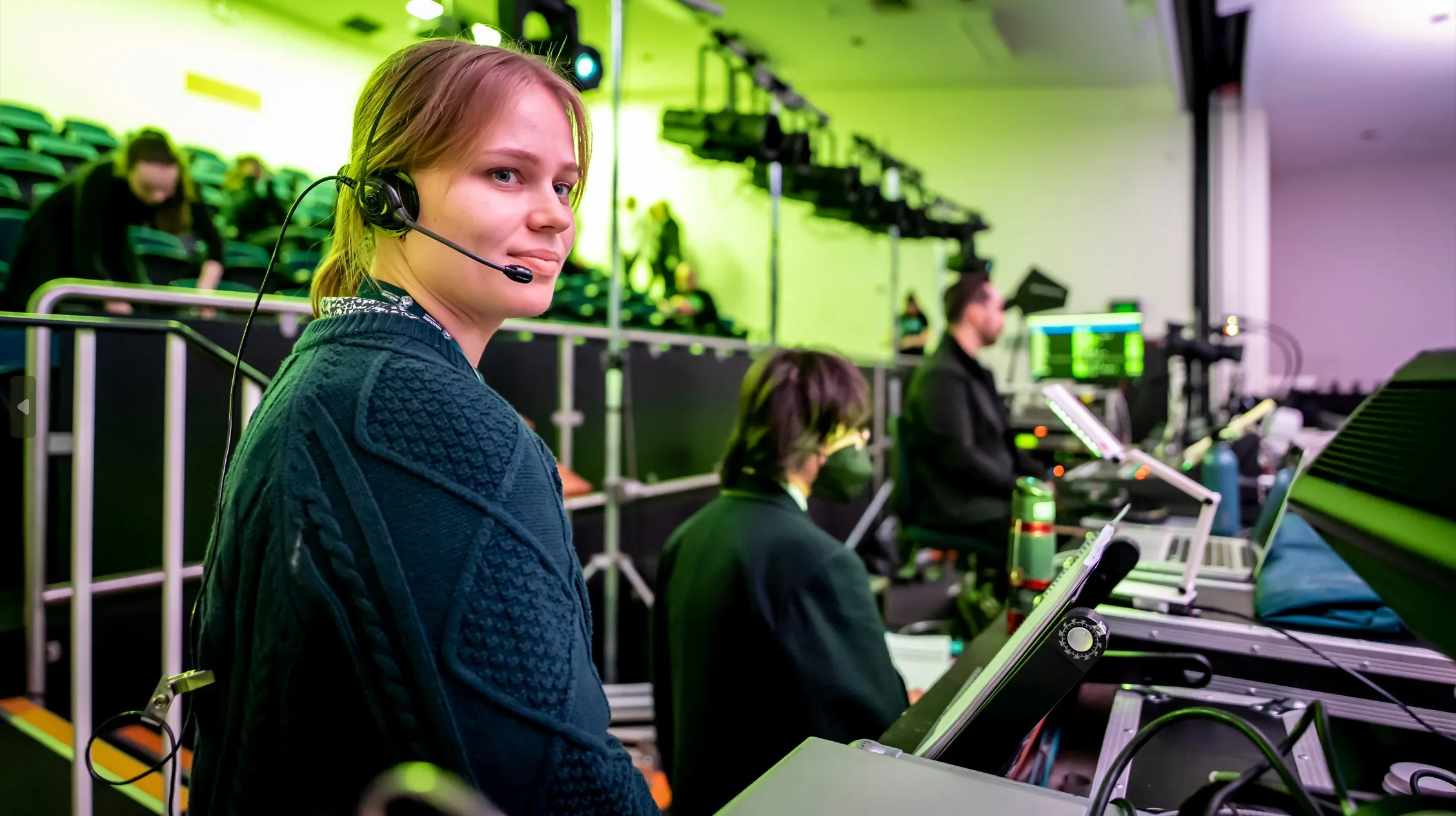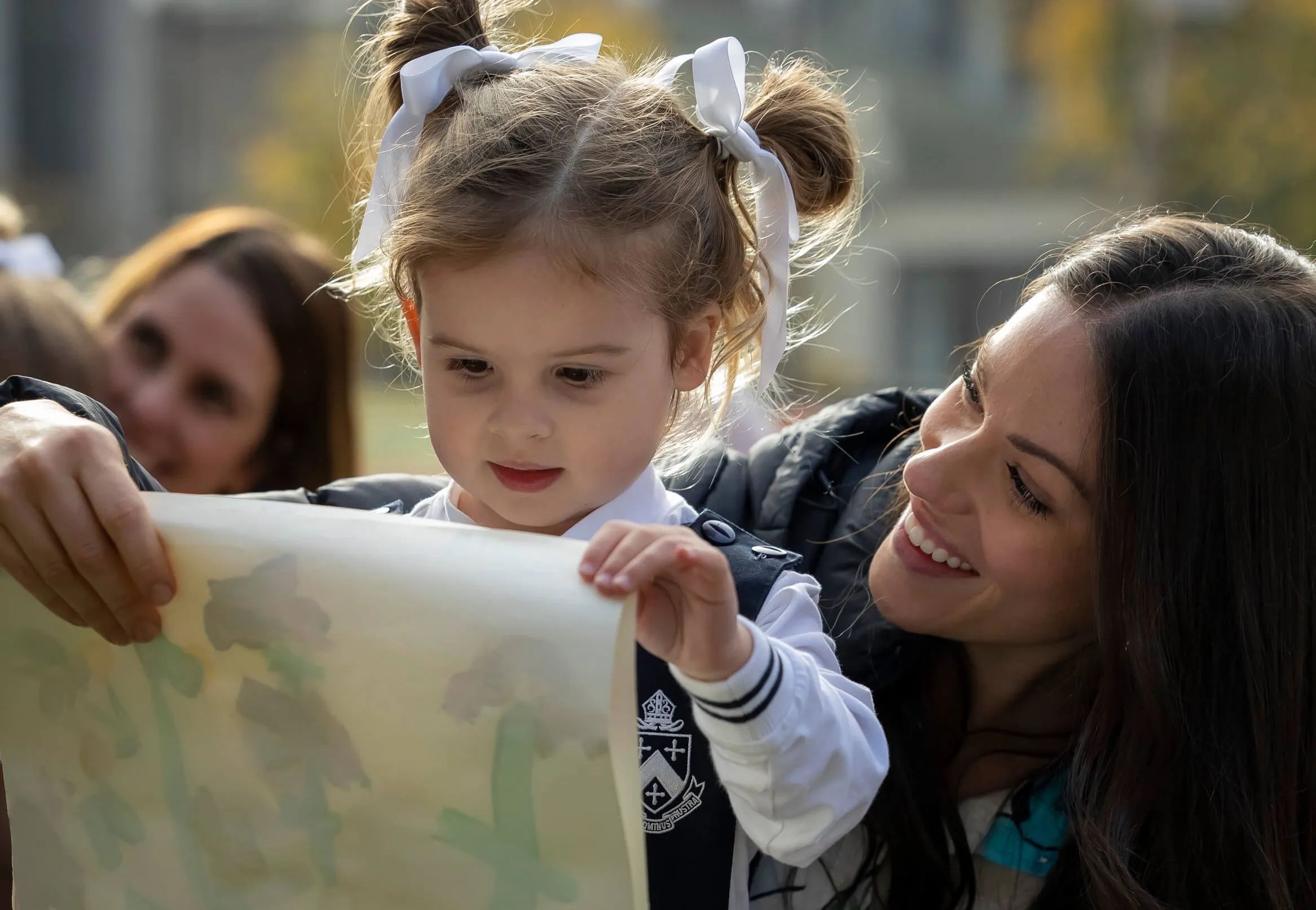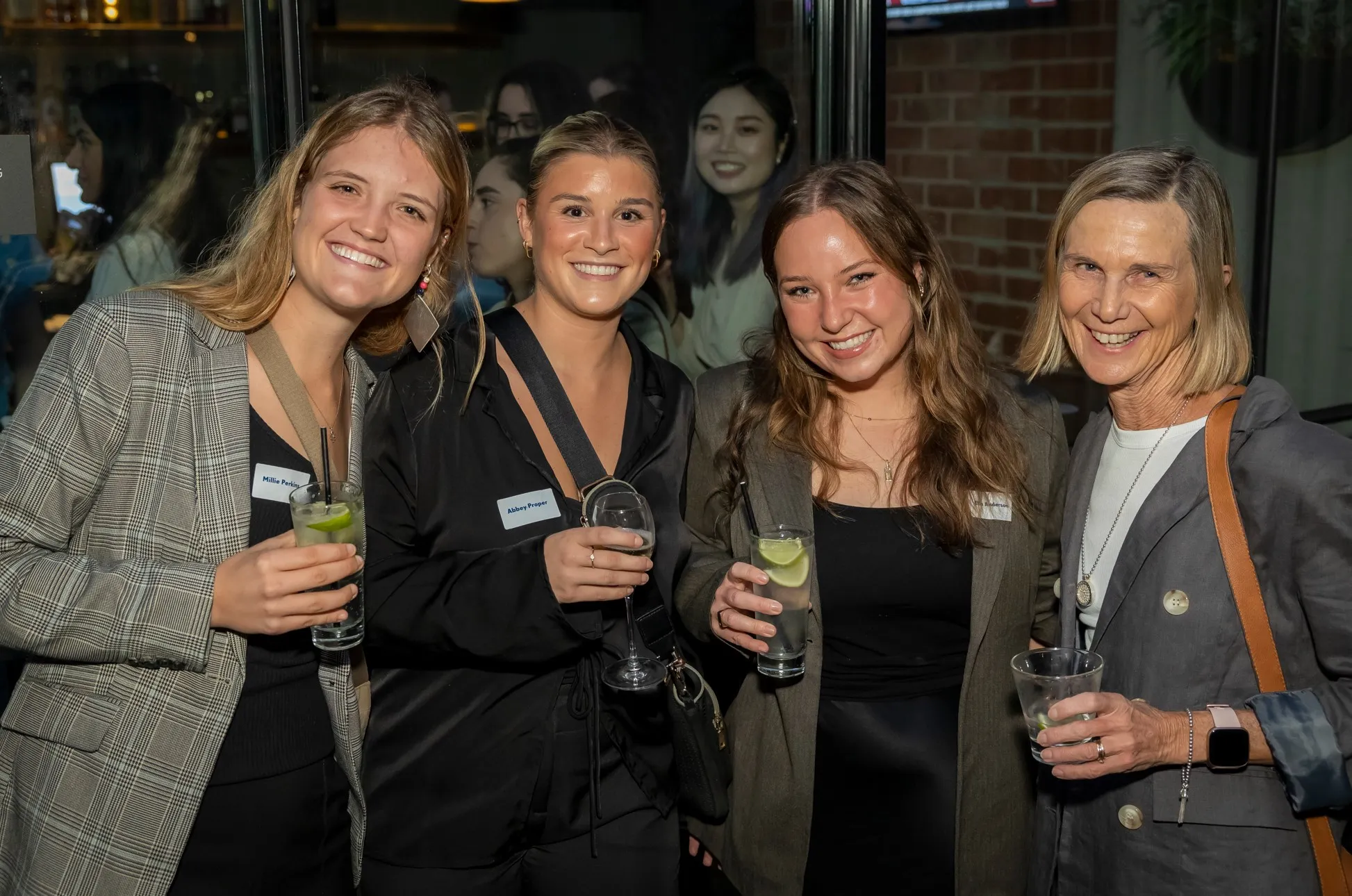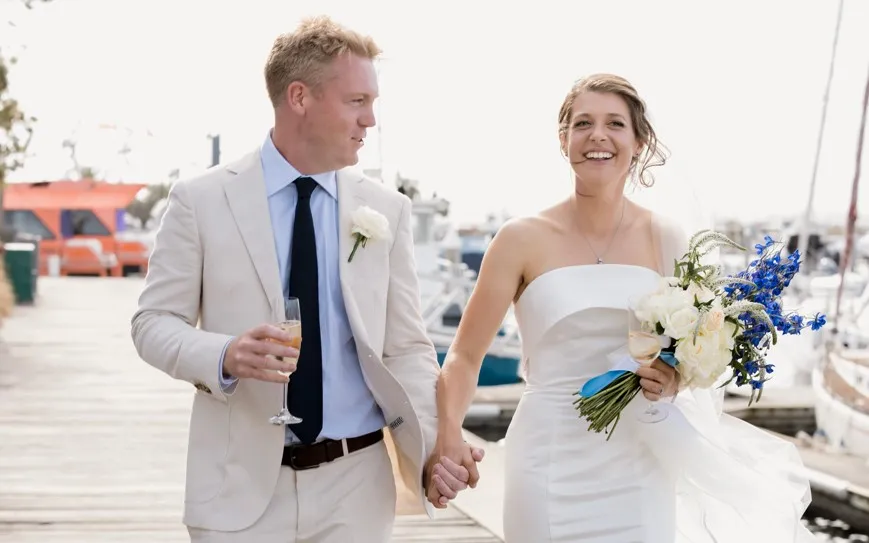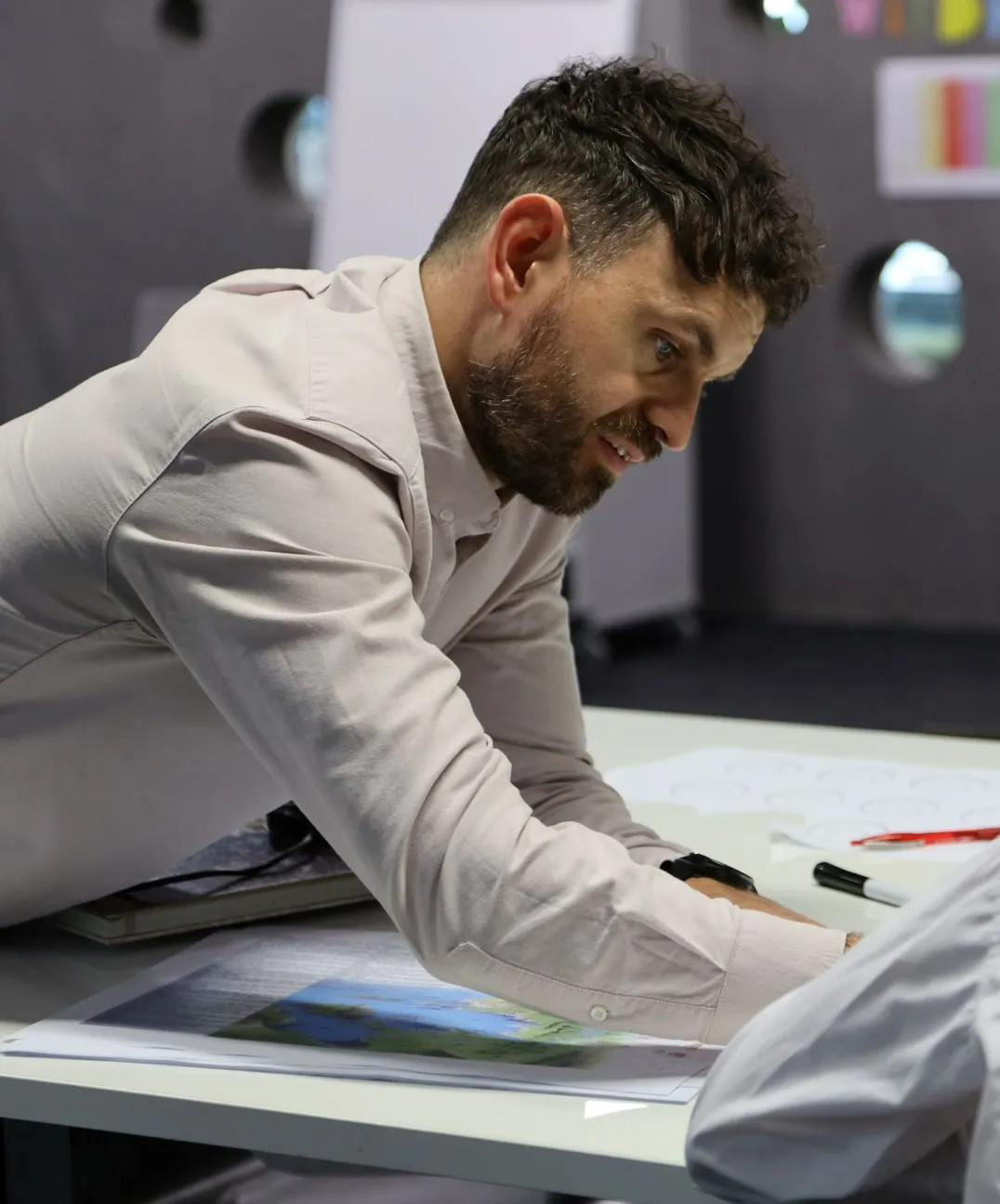

MEET OUR DEDICATED TEACHERS.


MEET OUR DEDICATED TEACHERS.
Chalk it up to Experience: Meet our Dedicated Teachers
At Melbourne Girls Grammar, we are privileged to have a community of dedicated staff with years of experience in their respective fields. Their adaptability to change and commitment to improving their teaching practices exemplify MGGS's continued innovation in education.

We spoke to three of our talented staff members about their teaching journeys, and what the future of education looks like to them.
Karen McClintock, Junior Years Teacher
We spoke to three of our talented staff members about their teaching journeys, and what the future of education looks like to them.
Karen McClintock, Junior Years Teacher
We spoke to three of our talented staff members about their teaching journeys, and what the future of education looks like to them.
Karen McClintock, Junior Years Teacher
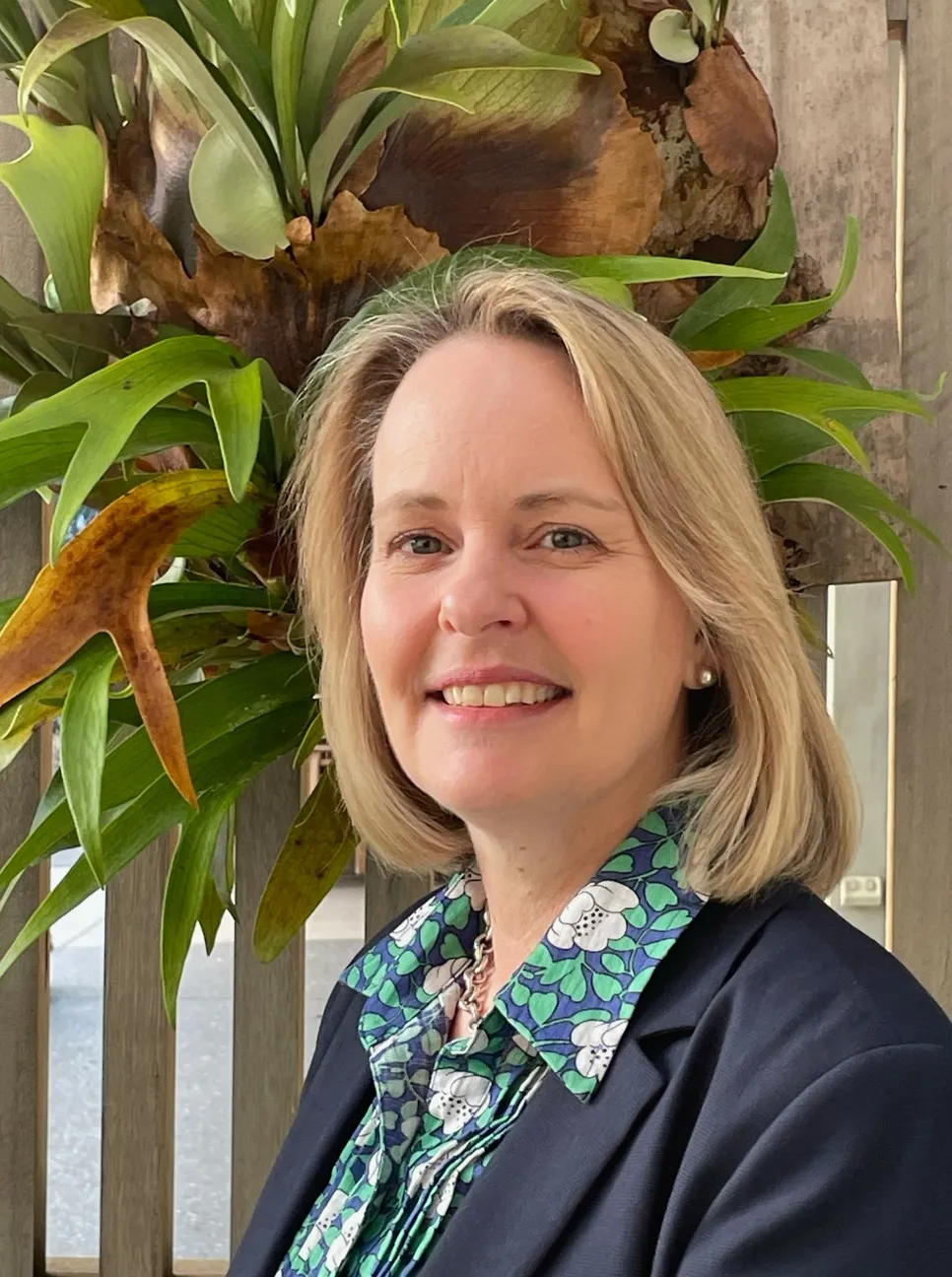

Karen McClintock



Karen McClintock
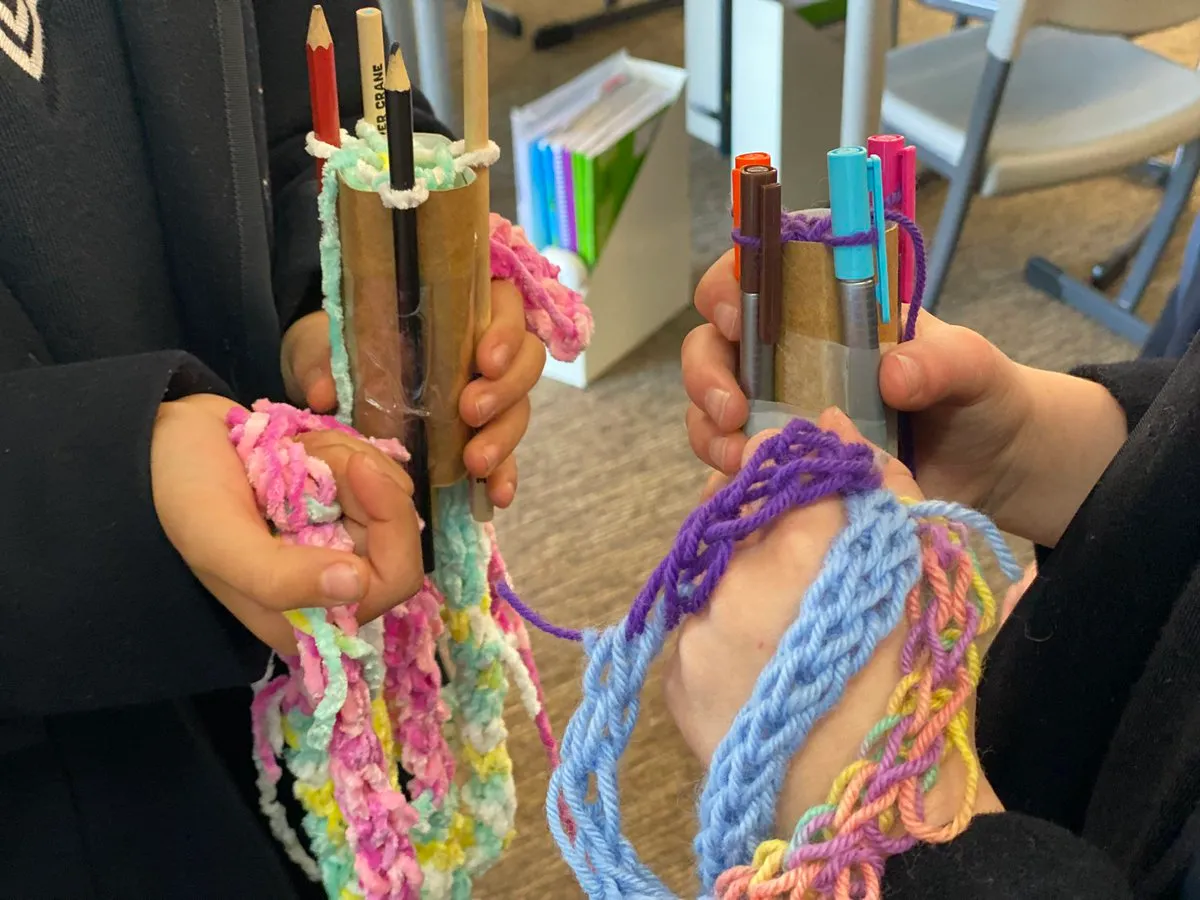

Karen taught her Year 2 students how to knit in 2022.
“Teaching is not merely a profession for me; it is a calling driven by my passion for inspiring young minds.”
- Karen McClintock, Junior Years Teacher
Education has shaped Karen McClintock’s career for over two decades. Her teaching journey began in the remote town of Wilcannia, NSW. After seven and a half years of teaching in London, she officially joined MGGS in 2009. Throughout her time here, Karen has guided students from Prep to Year 4, as well as actively contributing to the School community in leadership roles including Remote Learning Coach, Seesaw Co-ordinator, Curriculum Leader, Digital Co-ordinator and Building Learning Power Co-ordinator.
“With unwavering passion, I create engaging learning environments that empower students and positively impact their educational journeys,” Karen says. “Teaching is not just a job; it is my calling, and I am grateful to fulfil it within the vibrant MGGS community.”
Currently, Karen teaches Prep, which she describes as her "passion".
“There’s something magical about witnessing that ‘a-ha’ moment when a child’s face lights up with understanding or when they proudly share a brilliant idea of their own.
"I am dedicated to providing my students with meaningful experiences, igniting their curiosity, and guiding them towards becoming lifelong learners. Through my own journey as a teacher, I aspire to make a lasting difference in the lives of my students.”
Karen remains driven in her career by “being open to possibilities”.
“Every student has unique talents, interests, and potential waiting to be discovered. By embracing a mindset of openness, I am constantly seeking new approaches, strategies, and resources that can unlock the full potential of my students and create meaningful learning experiences.”
For the Prep teacher, being open to possibilities also means embracing advancements in technology and its influence on education. "Technology plays a significant role in shaping various aspects of our lives in today’s rapidly evolving world,” Karen attests. “It has the potential to revolutionise and enhance the learning experience for students. By embracing changes and integrating innovative technologies into our pedagogical practices, we can create dynamic and engaging learning environments that cater to the needs and interests of our students. This, in turn, can foster their curiosity and promote active participation in their own learning journey.”
In her own classroom, Karen embraces innovation “by incorporating technology and strategies that promote active learning and creativity”. She does this through the use of VR, AR, iPads, and Apple Classroom, as well as through hands-on activities and project-based experiences. “Whether conducting experiments, tackling real-world challenges, or engaging in simulations, these dynamic activities foster critical thinking, problem-solving abilities and unleash creativity. My ultimate goal is to inspire my students to become lifelong learners, instilling a sense of curiosity, innovation, and readiness to overcome obstacles in the future that they may encounter.”
When it comes to the future of teaching and innovation, Karen is adamant that our School is “at the forefront of innovative classroom practices that embrace exciting advancements. It's exhilarating to see our classrooms as dynamic and inclusive spaces that prepare our students for the fast-paced world they'll step into. We're redefining our teaching methods to prioritise essential skills like global citizenship, innovation, creativity, and technological proficiency”, she shares. “We aim to empower our students to collaborate effectively, respect diversity, and make responsible choices in this digital age. With these transformative experiences, our graduates will emerge as well-rounded women of action, ready to thrive in an interconnected and diverse society.”
The biggest lesson Karen has learned throughout her teaching career is...
“That in challenging our assumptions and being open-minded, we can foster a culture of empathy, understanding, and collaboration. By actively listening, we not only validate the experiences and perspectives of others but also create a safe space for open dialogue and mutual growth. We are responsible for championing, supporting and nurturing each student so they feel valued, respected, and capable of achieving greatness.”
Rory McCaughey, Middle Years Teacher
“Teaching is not merely a profession for me; it is a calling driven by my passion for inspiring young minds.”
- Karen McClintock, Junior Years Teacher
Education has shaped Karen McClintock’s career for over two decades. Her teaching journey began in the remote town of Wilcannia, NSW. After seven and a half years of teaching in London, she officially joined MGGS in 2009. Throughout her time here, Karen has guided students from Prep to Year 4, as well as actively contributing to the School community in leadership roles including Remote Learning Coach, Seesaw Co-ordinator, Curriculum Leader, Digital Co-ordinator and Building Learning Power Co-ordinator.
“With unwavering passion, I create engaging learning environments that empower students and positively impact their educational journeys,” Karen says. “Teaching is not just a job; it is my calling, and I am grateful to fulfil it within the vibrant MGGS community.”
Currently, Karen teaches Prep, which she describes as her "passion".
“There’s something magical about witnessing that ‘a-ha’ moment when a child’s face lights up with understanding or when they proudly share a brilliant idea of their own.
"I am dedicated to providing my students with meaningful experiences, igniting their curiosity, and guiding them towards becoming lifelong learners. Through my own journey as a teacher, I aspire to make a lasting difference in the lives of my students.”
Karen remains driven in her career by “being open to possibilities”.
“Every student has unique talents, interests, and potential waiting to be discovered. By embracing a mindset of openness, I am constantly seeking new approaches, strategies, and resources that can unlock the full potential of my students and create meaningful learning experiences.”
For the Prep teacher, being open to possibilities also means embracing advancements in technology and its influence on education. "Technology plays a significant role in shaping various aspects of our lives in today’s rapidly evolving world,” Karen attests. “It has the potential to revolutionise and enhance the learning experience for students. By embracing changes and integrating innovative technologies into our pedagogical practices, we can create dynamic and engaging learning environments that cater to the needs and interests of our students. This, in turn, can foster their curiosity and promote active participation in their own learning journey.”
In her own classroom, Karen embraces innovation “by incorporating technology and strategies that promote active learning and creativity”. She does this through the use of VR, AR, iPads, and Apple Classroom, as well as through hands-on activities and project-based experiences. “Whether conducting experiments, tackling real-world challenges, or engaging in simulations, these dynamic activities foster critical thinking, problem-solving abilities and unleash creativity. My ultimate goal is to inspire my students to become lifelong learners, instilling a sense of curiosity, innovation, and readiness to overcome obstacles in the future that they may encounter.”
When it comes to the future of teaching and innovation, Karen is adamant that our School is “at the forefront of innovative classroom practices that embrace exciting advancements. It's exhilarating to see our classrooms as dynamic and inclusive spaces that prepare our students for the fast-paced world they'll step into. We're redefining our teaching methods to prioritise essential skills like global citizenship, innovation, creativity, and technological proficiency”, she shares. “We aim to empower our students to collaborate effectively, respect diversity, and make responsible choices in this digital age. With these transformative experiences, our graduates will emerge as well-rounded women of action, ready to thrive in an interconnected and diverse society.”
The biggest lesson Karen has learned throughout her teaching career is...
“That in challenging our assumptions and being open-minded, we can foster a culture of empathy, understanding, and collaboration. By actively listening, we not only validate the experiences and perspectives of others but also create a safe space for open dialogue and mutual growth. We are responsible for championing, supporting and nurturing each student so they feel valued, respected, and capable of achieving greatness.”
Rory McCaughey, Middle Years Teacher
“Teaching is not merely a profession for me; it is a calling driven by my passion for inspiring young minds.”
- Karen McClintock, Junior Years Teacher
Education has shaped Karen McClintock’s career for over two decades. Her teaching journey began in the remote town of Wilcannia, NSW. After seven and a half years of teaching in London, she officially joined MGGS in 2009. Throughout her time here, Karen has guided students from Prep to Year 4, as well as actively contributing to the School community in leadership roles including Remote Learning Coach, Seesaw Co-ordinator, Curriculum Leader, Digital Co-ordinator and Building Learning Power Co-ordinator.
“With unwavering passion, I create engaging learning environments that empower students and positively impact their educational journeys,” Karen says. “Teaching is not just a job; it is my calling, and I am grateful to fulfil it within the vibrant MGGS community.”
Currently, Karen teaches Prep, which she describes as her "passion".
“There’s something magical about witnessing that ‘a-ha’ moment when a child’s face lights up with understanding or when they proudly share a brilliant idea of their own.
"I am dedicated to providing my students with meaningful experiences, igniting their curiosity, and guiding them towards becoming lifelong learners. Through my own journey as a teacher, I aspire to make a lasting difference in the lives of my students.”
Karen remains driven in her career by “being open to possibilities”.
“Every student has unique talents, interests, and potential waiting to be discovered. By embracing a mindset of openness, I am constantly seeking new approaches, strategies, and resources that can unlock the full potential of my students and create meaningful learning experiences.”
For the Prep teacher, being open to possibilities also means embracing advancements in technology and its influence on education. "Technology plays a significant role in shaping various aspects of our lives in today’s rapidly evolving world,” Karen attests. “It has the potential to revolutionise and enhance the learning experience for students. By embracing changes and integrating innovative technologies into our pedagogical practices, we can create dynamic and engaging learning environments that cater to the needs and interests of our students. This, in turn, can foster their curiosity and promote active participation in their own learning journey.”
In her own classroom, Karen embraces innovation “by incorporating technology and strategies that promote active learning and creativity”. She does this through the use of VR, AR, iPads, and Apple Classroom, as well as through hands-on activities and project-based experiences. “Whether conducting experiments, tackling real-world challenges, or engaging in simulations, these dynamic activities foster critical thinking, problem-solving abilities and unleash creativity. My ultimate goal is to inspire my students to become lifelong learners, instilling a sense of curiosity, innovation, and readiness to overcome obstacles in the future that they may encounter.”
When it comes to the future of teaching and innovation, Karen is adamant that our School is “at the forefront of innovative classroom practices that embrace exciting advancements. It's exhilarating to see our classrooms as dynamic and inclusive spaces that prepare our students for the fast-paced world they'll step into. We're redefining our teaching methods to prioritise essential skills like global citizenship, innovation, creativity, and technological proficiency”, she shares. “We aim to empower our students to collaborate effectively, respect diversity, and make responsible choices in this digital age. With these transformative experiences, our graduates will emerge as well-rounded women of action, ready to thrive in an interconnected and diverse society.”
The biggest lesson Karen has learned throughout her teaching career is...
“That in challenging our assumptions and being open-minded, we can foster a culture of empathy, understanding, and collaboration. By actively listening, we not only validate the experiences and perspectives of others but also create a safe space for open dialogue and mutual growth. We are responsible for championing, supporting and nurturing each student so they feel valued, respected, and capable of achieving greatness.”
Rory McCaughey, Middle Years Teacher
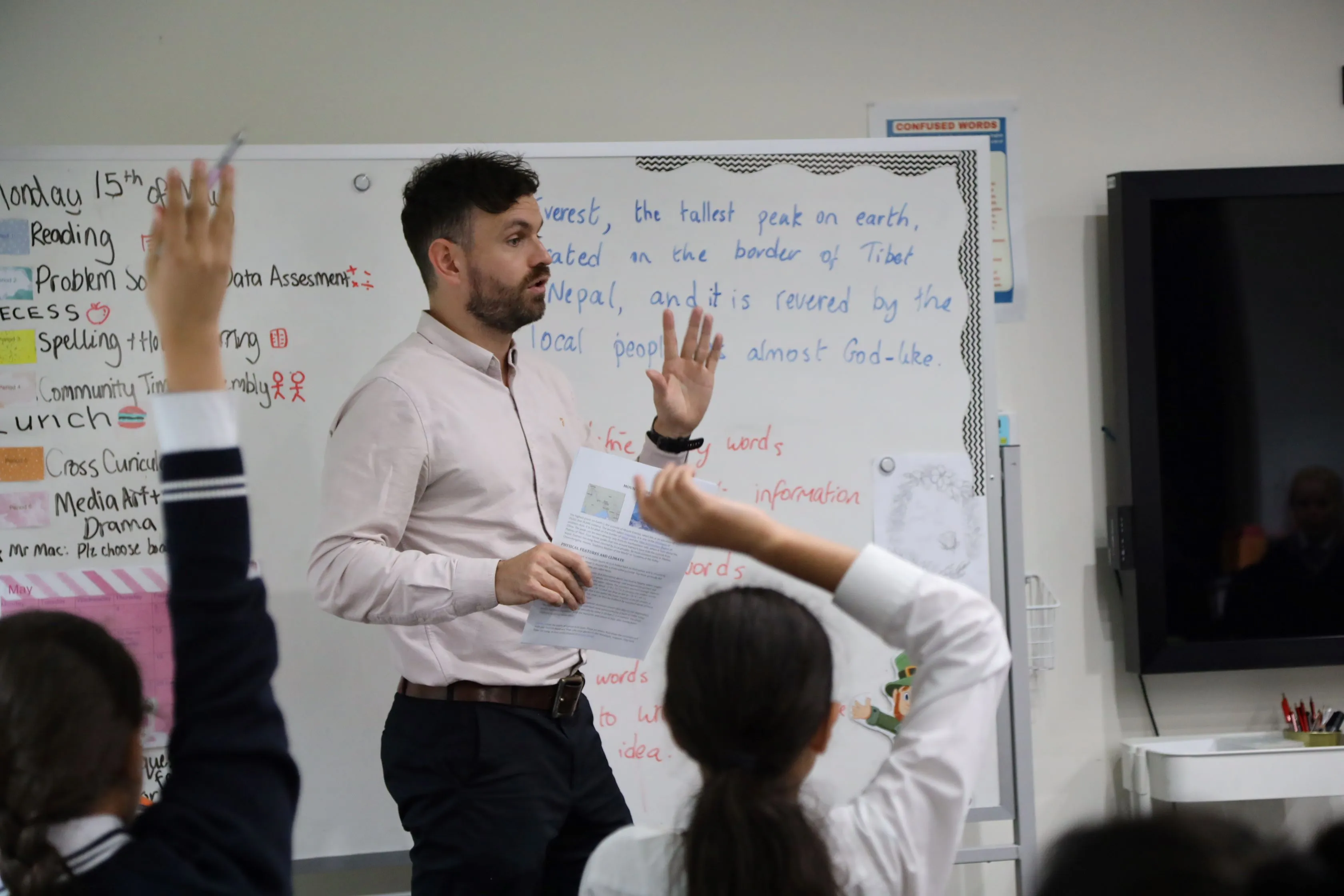

Rory McCaughey



Rory McCaughey
“There is no end to the learning that can be done to improve as a teacher.”
- Rory McCaughey, Middle Years Teacher
With a psychology degree and plenty of travel under his belt, Rory McCaughey ended up in Belfast “wondering what the next step was”. He then got a job as a Learning Support Assistant at his alma mater, and as a coach of Gaelic football teams. “I found the experience of supporting students with their learning to be incredibly rewarding and enjoyable,” he tells us. “As a result, I enrolled in a PGDE Primary Teaching in Glasgow for the following year. I’ve been teaching every year since then!”
Rory originally started at MGGS as a Year 5 teacher, moving to Year 6 a year later; here, he began the roles of coordinator and classroom teacher. At the beginning of last year, Rory also became an Instructional Coach. “Since then, I have been developing my knowledge and skills as a coach while working alongside both primary and secondary teachers to improve specific aspects of their instructional practice,” he says.
When it comes to his career as an educator, Rory is motivated by “the fact there is no end to learning. There are so many facets of teaching that one could become an ‘expert in’. For example, curriculum, instructional practice, the science of learning, feedback techniques, wellbeing, relationship development ... the list goes on forever,” he asserts.
“At times that can feel overwhelming, but when you know that the learning you do as a teacher directly benefits the students you teach, that makes it worthwhile and helps you to stay motivated when you [could] feel like giving up!”
As his career has progressed, Rory has become more aware of the complexities of teaching and learning, which is why he enrolled in a Master of Education in Cognitive Psychology and Educational Practice. “When I studied to be a teacher there were no classes related to Cognitive Psychology and how humans learn,” he explains. “We learned about curriculum, lesson planning and classroom management. A large part of a teacher’s job involves helping students to process new information and commit it to long term memory. “Developing strategies to overcome the limitations of working memory as well as choosing effective learning strategies to commit information to long term memory enables a teacher to be much more impactful in their role.”
Rory has incorporated his studies into the classroom by refining and improving his instruction techniques. “I think carefully about how many instructions I give, how I sequence those instructions, the supporting scaffolds to use when teaching a new concept, such as what visual representations can be used and how best to use them to reduce cognitive load.”
As a result, the Middle Years’ teacher now has a greater “depth of knowledge about the factors that can impact or impede learning. Like a doctor diagnosing a patient, I believe teachers can examine a student’s learning challenges from multiple perspectives before deciding how to support them. A learning issue could arise due to an overload of working memory, a lack of prior knowledge, perhaps a student has low motivation for learning because of low self-efficacy in a specific subject, or maybe they find it difficult to manage distractions.”
Over the years, Rory's understanding of innovation and how it relates to pedagogical practices has changed. “I used to believe that innovation in education involved incorporating technology into your classroom practice in new and interesting ways, or teaching in innovative spaces that enabled collaboration and gave students the options to choose where and how they worked,” he says. “While there is a place for all of those things, I think that, currently, innovation relates to how I can incorporate well-researched educational theories into my practice and the instructional practice of my team to have the maximum impact on the learners we teach. Not just to help them achieve high academic outcomes, but also to equip them with the skills, knowledge and beliefs to be successful learners beyond school and well into their careers. Given society’s trajectory, our students will constantly have to up-skill, develop new knowledge and even un-learn as part of their professional career. Having confidence in oneself as a learner is vital in this regard.”
When it comes to expanding both his own learning and the learning of others, Rory attests that MGGS has always been incredibly supportive of his endeavours. “The level of agency and trust is incredibly motivating and creates a strong team environment,” he insists, “There are always interesting and innovative programs that teachers can take part in at school to develop their pedagogical knowledge. In fact, it was an internal professional development program on SRL that sparked my interest in the area that led me to study my Masters.
The biggest lesson Rory has learned throughout his teaching career is...
“To focus on the learning. In every lesson that is taught or unit that is designed, a teacher should be very clear on what exactly is being learned and how they are structuring the lesson, or series of lessons, to facilitate that learning."
Alexandra Grimwade, Senior Years Teacher
“There is no end to the learning that can be done to improve as a teacher.”
- Rory McCaughey, Middle Years Teacher
With a psychology degree and plenty of travel under his belt, Rory McCaughey ended up in Belfast “wondering what the next step was”. He then got a job as a Learning Support Assistant at his alma mater, and as a coach of Gaelic football teams. “I found the experience of supporting students with their learning to be incredibly rewarding and enjoyable,” he tells us. “As a result, I enrolled in a PGDE Primary Teaching in Glasgow for the following year. I’ve been teaching every year since then!”
Rory originally started at MGGS as a Year 5 teacher, moving to Year 6 a year later; here, he began the roles of coordinator and classroom teacher. At the beginning of last year, Rory also became an Instructional Coach. “Since then, I have been developing my knowledge and skills as a coach while working alongside both primary and secondary teachers to improve specific aspects of their instructional practice,” he says.
When it comes to his career as an educator, Rory is motivated by “the fact there is no end to learning. There are so many facets of teaching that one could become an ‘expert in’. For example, curriculum, instructional practice, the science of learning, feedback techniques, wellbeing, relationship development ... the list goes on forever,” he asserts.
“At times that can feel overwhelming, but when you know that the learning you do as a teacher directly benefits the students you teach, that makes it worthwhile and helps you to stay motivated when you [could] feel like giving up!”
As his career has progressed, Rory has become more aware of the complexities of teaching and learning, which is why he enrolled in a Master of Education in Cognitive Psychology and Educational Practice. “When I studied to be a teacher there were no classes related to Cognitive Psychology and how humans learn,” he explains. “We learned about curriculum, lesson planning and classroom management. A large part of a teacher’s job involves helping students to process new information and commit it to long term memory. “Developing strategies to overcome the limitations of working memory as well as choosing effective learning strategies to commit information to long term memory enables a teacher to be much more impactful in their role.”
Rory has incorporated his studies into the classroom by refining and improving his instruction techniques. “I think carefully about how many instructions I give, how I sequence those instructions, the supporting scaffolds to use when teaching a new concept, such as what visual representations can be used and how best to use them to reduce cognitive load.”
As a result, the Middle Years’ teacher now has a greater “depth of knowledge about the factors that can impact or impede learning. Like a doctor diagnosing a patient, I believe teachers can examine a student’s learning challenges from multiple perspectives before deciding how to support them. A learning issue could arise due to an overload of working memory, a lack of prior knowledge, perhaps a student has low motivation for learning because of low self-efficacy in a specific subject, or maybe they find it difficult to manage distractions.”
Over the years, Rory's understanding of innovation and how it relates to pedagogical practices has changed. “I used to believe that innovation in education involved incorporating technology into your classroom practice in new and interesting ways, or teaching in innovative spaces that enabled collaboration and gave students the options to choose where and how they worked,” he says. “While there is a place for all of those things, I think that, currently, innovation relates to how I can incorporate well-researched educational theories into my practice and the instructional practice of my team to have the maximum impact on the learners we teach. Not just to help them achieve high academic outcomes, but also to equip them with the skills, knowledge and beliefs to be successful learners beyond school and well into their careers. Given society’s trajectory, our students will constantly have to up-skill, develop new knowledge and even un-learn as part of their professional career. Having confidence in oneself as a learner is vital in this regard.”
When it comes to expanding both his own learning and the learning of others, Rory attests that MGGS has always been incredibly supportive of his endeavours. “The level of agency and trust is incredibly motivating and creates a strong team environment,” he insists, “There are always interesting and innovative programs that teachers can take part in at school to develop their pedagogical knowledge. In fact, it was an internal professional development program on SRL that sparked my interest in the area that led me to study my Masters.
The biggest lesson Rory has learned throughout his teaching career is...
“To focus on the learning. In every lesson that is taught or unit that is designed, a teacher should be very clear on what exactly is being learned and how they are structuring the lesson, or series of lessons, to facilitate that learning."
Alexandra Grimwade, Senior Years Teacher
“There is no end to the learning that can be done to improve as a teacher.”
- Rory McCaughey, Middle Years Teacher
With a psychology degree and plenty of travel under his belt, Rory McCaughey ended up in Belfast “wondering what the next step was”. He then got a job as a Learning Support Assistant at his alma mater, and as a coach of Gaelic football teams. “I found the experience of supporting students with their learning to be incredibly rewarding and enjoyable,” he tells us. “As a result, I enrolled in a PGDE Primary Teaching in Glasgow for the following year. I’ve been teaching every year since then!”
Rory originally started at MGGS as a Year 5 teacher, moving to Year 6 a year later; here, he began the roles of coordinator and classroom teacher. At the beginning of last year, Rory also became an Instructional Coach. “Since then, I have been developing my knowledge and skills as a coach while working alongside both primary and secondary teachers to improve specific aspects of their instructional practice,” he says.
When it comes to his career as an educator, Rory is motivated by “the fact there is no end to learning. There are so many facets of teaching that one could become an ‘expert in’. For example, curriculum, instructional practice, the science of learning, feedback techniques, wellbeing, relationship development ... the list goes on forever,” he asserts.
“At times that can feel overwhelming, but when you know that the learning you do as a teacher directly benefits the students you teach, that makes it worthwhile and helps you to stay motivated when you [could] feel like giving up!”
As his career has progressed, Rory has become more aware of the complexities of teaching and learning, which is why he enrolled in a Master of Education in Cognitive Psychology and Educational Practice. “When I studied to be a teacher there were no classes related to Cognitive Psychology and how humans learn,” he explains. “We learned about curriculum, lesson planning and classroom management. A large part of a teacher’s job involves helping students to process new information and commit it to long term memory. “Developing strategies to overcome the limitations of working memory as well as choosing effective learning strategies to commit information to long term memory enables a teacher to be much more impactful in their role.”
Rory has incorporated his studies into the classroom by refining and improving his instruction techniques. “I think carefully about how many instructions I give, how I sequence those instructions, the supporting scaffolds to use when teaching a new concept, such as what visual representations can be used and how best to use them to reduce cognitive load.”
As a result, the Middle Years’ teacher now has a greater “depth of knowledge about the factors that can impact or impede learning. Like a doctor diagnosing a patient, I believe teachers can examine a student’s learning challenges from multiple perspectives before deciding how to support them. A learning issue could arise due to an overload of working memory, a lack of prior knowledge, perhaps a student has low motivation for learning because of low self-efficacy in a specific subject, or maybe they find it difficult to manage distractions.”
Over the years, Rory's understanding of innovation and how it relates to pedagogical practices has changed. “I used to believe that innovation in education involved incorporating technology into your classroom practice in new and interesting ways, or teaching in innovative spaces that enabled collaboration and gave students the options to choose where and how they worked,” he says. “While there is a place for all of those things, I think that, currently, innovation relates to how I can incorporate well-researched educational theories into my practice and the instructional practice of my team to have the maximum impact on the learners we teach. Not just to help them achieve high academic outcomes, but also to equip them with the skills, knowledge and beliefs to be successful learners beyond school and well into their careers. Given society’s trajectory, our students will constantly have to up-skill, develop new knowledge and even un-learn as part of their professional career. Having confidence in oneself as a learner is vital in this regard.”
When it comes to expanding both his own learning and the learning of others, Rory attests that MGGS has always been incredibly supportive of his endeavours. “The level of agency and trust is incredibly motivating and creates a strong team environment,” he insists, “There are always interesting and innovative programs that teachers can take part in at school to develop their pedagogical knowledge. In fact, it was an internal professional development program on SRL that sparked my interest in the area that led me to study my Masters.
The biggest lesson Rory has learned throughout his teaching career is...
“To focus on the learning. In every lesson that is taught or unit that is designed, a teacher should be very clear on what exactly is being learned and how they are structuring the lesson, or series of lessons, to facilitate that learning."
Alexandra Grimwade, Senior Years Teacher
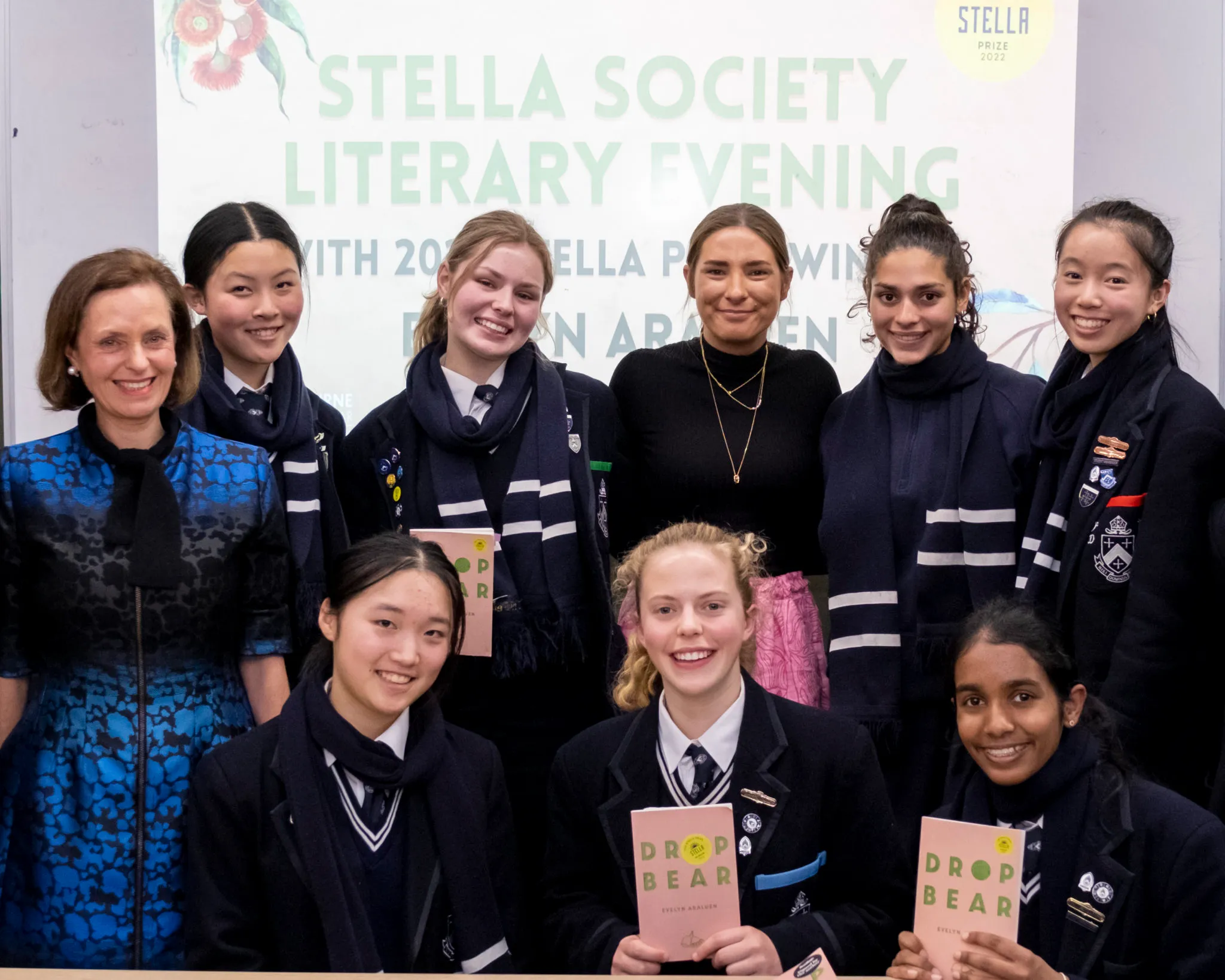

MGGS's Stella society with Alexandra Grimwade and author Evelyn Araluen.



MGGS's Stella society with Alexandra Grimwade and author Evelyn Araluen.


MGGS's Stella society with Alexandra Grimwade and author Evelyn Araluen.
“I chose teaching as a career to satisfy my intellectual curiosity.”
- Alexandra Grimwade, Senior Years Teacher
After studying Arts and Law, with a major in English Literature, Alexandra Grimwade began her career in the parliament of NSW, and in Commercial Law. She then worked within the home while she raised four children, undertaking a Master of Teaching at Melbourne University in 2008. This began her “love affair with the teaching profession”.
Alexandra’s passion for teaching intensified when her children began school.
“My kids all had very original ‘learning profiles’ and I was interested in the intellectual rigour that underpins classroom practice,” she explains. Equally, this teacher’s passion for books, writing, poetry and theatre has influenced her career.
“I love introducing students to classics and new texts of great literary merit,” she enthuses. “It is a responsibility of each generation to teach critical literacy to the next, to keep democracy alive, and I am proud that my job enables me to do this every day.”
When it comes to reading, Alexandra has played an active role in overseeing MGGS’s Stella Society, which gives students a chance to read beyond the curriculum and engage with newly published work. “Students are engaged with only a limited number of texts through the school curriculum, so our librarians and wider reading program at MGGS supplement and encourage reading for pleasure beyond what is set for schoolwork,” the educator says.
“Poets Evelyn Araluen and Sarah Holland-Batt have won the Stella Prize in the last two years, promoting their brilliant work and allowing our students to immerse themselves in the craft of poetic language, while being at the cutting edge of contemporary intellectual debates about indigenous participation and aged-care.”
Alexandra has also been very vocal with regards to supporting, recognising and celebrating women and non-binary authors who have been historically underrepresented. “In Year 8, we introduced a new unit on poetry, giving us the opportunity to teach under-recognised female poets from each period, like HD (Hilda Doolittle) an American modernist poet,” Alexandra tells us. “From the Counter-Cultural era we taught poems by the great Indigenous activist and poet Oodgeroo Noonoocal (Kath Walker), keeping her voice alive into this generation.”
Ensuring that Grammarians learn from a range of different perspectives, including both historical and emerging voices, is just one of the ways MGGS’s English department remains innovative and adaptable. “Our faculty is brimming with very talented teachers who communicate and prepare courses in teams and cross-fertilise ideas,” Alexandra says. “Being involved in professional development offered by VATE (the Victorian Association for the Teaching of English) and doing VCE assessing also allows teachers to keep in touch with newest trends in the profession. We are also encouraged to read widely and contribute to text selection.”
The biggest lesson Alexandra has learned throughout her teaching career is...
“A genuine and well-timed compliment to a student is the most powerful tool in the teaching repertoire and can motivate even the most recalcitrant of students.”
“I chose teaching as a career to satisfy my intellectual curiosity.”
- Alexandra Grimwade, Senior Years Teacher
After studying Arts and Law, with a major in English Literature, Alexandra Grimwade began her career in the parliament of NSW, and in Commercial Law. She then worked within the home while she raised four children, undertaking a Master of Teaching at Melbourne University in 2008. This began her “love affair with the teaching profession”.
Alexandra’s passion for teaching intensified when her children began school.
“My kids all had very original ‘learning profiles’ and I was interested in the intellectual rigour that underpins classroom practice,” she explains. Equally, this teacher’s passion for books, writing, poetry and theatre has influenced her career.
“I love introducing students to classics and new texts of great literary merit,” she enthuses. “It is a responsibility of each generation to teach critical literacy to the next, to keep democracy alive, and I am proud that my job enables me to do this every day.”
When it comes to reading, Alexandra has played an active role in overseeing MGGS’s Stella Society, which gives students a chance to read beyond the curriculum and engage with newly published work. “Students are engaged with only a limited number of texts through the school curriculum, so our librarians and wider reading program at MGGS supplement and encourage reading for pleasure beyond what is set for schoolwork,” the educator says.
“Poets Evelyn Araluen and Sarah Holland-Batt have won the Stella Prize in the last two years, promoting their brilliant work and allowing our students to immerse themselves in the craft of poetic language, while being at the cutting edge of contemporary intellectual debates about indigenous participation and aged-care.”
Alexandra has also been very vocal with regards to supporting, recognising and celebrating women and non-binary authors who have been historically underrepresented. “In Year 8, we introduced a new unit on poetry, giving us the opportunity to teach under-recognised female poets from each period, like HD (Hilda Doolittle) an American modernist poet,” Alexandra tells us. “From the Counter-Cultural era we taught poems by the great Indigenous activist and poet Oodgeroo Noonoocal (Kath Walker), keeping her voice alive into this generation.”
Ensuring that Grammarians learn from a range of different perspectives, including both historical and emerging voices, is just one of the ways MGGS’s English department remains innovative and adaptable. “Our faculty is brimming with very talented teachers who communicate and prepare courses in teams and cross-fertilise ideas,” Alexandra says. “Being involved in professional development offered by VATE (the Victorian Association for the Teaching of English) and doing VCE assessing also allows teachers to keep in touch with newest trends in the profession. We are also encouraged to read widely and contribute to text selection.”
The biggest lesson Alexandra has learned throughout her teaching career is...
“A genuine and well-timed compliment to a student is the most powerful tool in the teaching repertoire and can motivate even the most recalcitrant of students.”







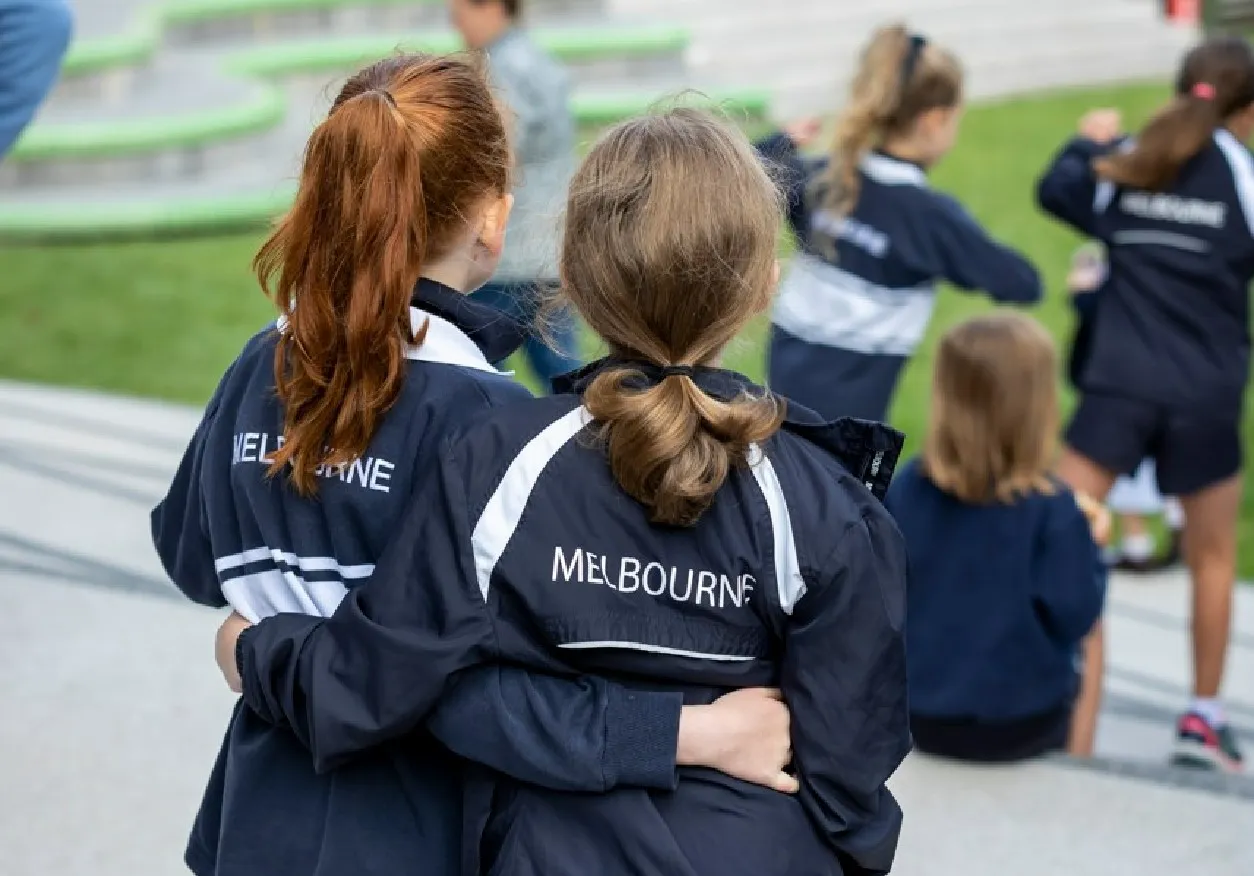

.webp)
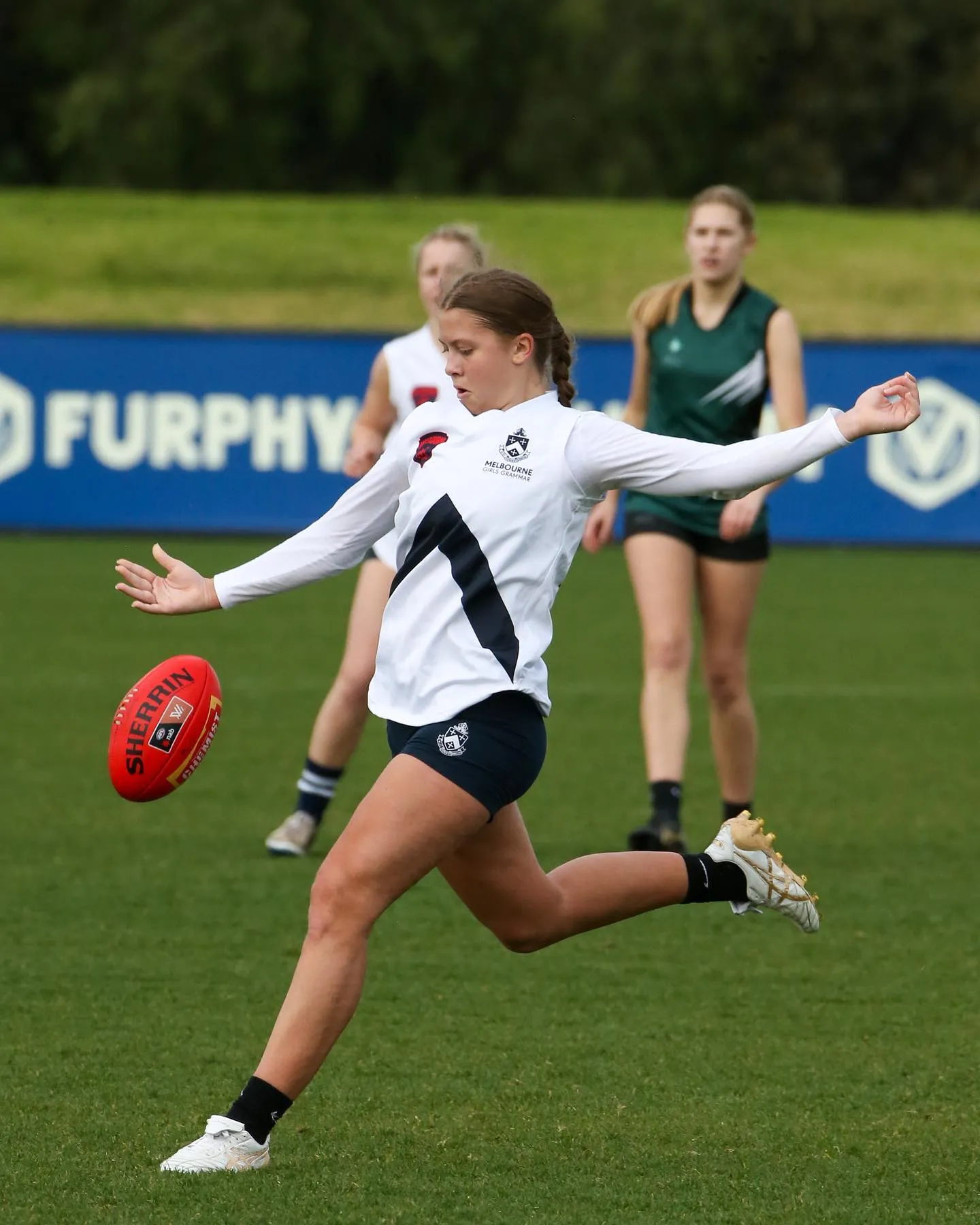
.webp)
